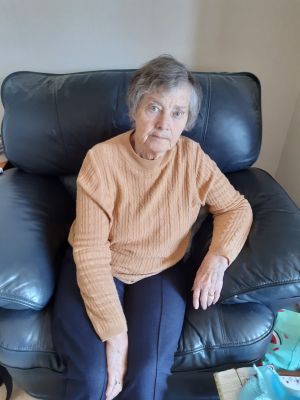
Jessie Moss
Saturday 20th June 2020
83-year-old retired office worker, Jessie Moss, was treated for severe aortic stenosis at the very height of the COVID-19 outbreak. Thanks to Professor Newby and the team in Edinburgh, and with the help of minimally invasive treatment, Jessie was able to receive the treatment she urgently required, and can now focus on her recovery and getting back out on the bowls green. Here, is her story:
“I was really tight in the chest last year when I was playing bowls, and then gradually I started to get short of breath and found myself having to sit and watch instead of play. At first, I thought it was just my age, to be honest, but then it was a case of if I walked a wee bit too quick I would feel like I would pass out. You make excuses for it and think you’re just getting older, but my daughter in law is a surgeon and her and my family told me to go to the doctor. Eventually, I did and I was put on the list to be treated. Then all this COVID-19 started and I was told they weren’t taking people in for open heart surgery.
Eventually though, I started to get really bad. I didn’t really know what to do. I was diagnosed at the beginning of the year and was on the waiting list for surgery but I don't think I would have been able to wait much longer. My daughter in law was really worried, and she knew about this treatment called TAVI and called my doctor about it.
I was more or less coming in a week or so for the procedure before it was suspended. But as I got worse my daughter in law, said we need it now. I was supposed to be getting open heart surgery, but there were fears about my hospital stay and recovery period. We decided TAVI was the best option, and eventually I went in on 21st April.
I went in on Friday, had an op for a stent on Monday, TAVI on Wednesday and then discharged 3 days later. I couldn’t have waited any longer. I could still be waiting now. Something had to be done.
I was tested twice for the virus when I was in the hospital, both negative. To be honest, once I was in there it never really worried me. All the precautions were being taken. They were absolutely fantastic. I can not praise them enough. They were absolutely marvellous. I was not frightened I would get anything, I felt perfectly safe at all times.
After my TAVI I felt great. You can breathe properly. And now, I feel incredible. I've got no problems with my breath. I’m going out to the garden and waking around. In a very short space of time, I’ve gone from feeling absolutely lousy to absolutely great. Now I just want to get out and start playing bowls again.”
Thank you Jessie, for your incredible story. Jessie highlights how hospitals have been able to adapt their treatment pathways in light of the COVID-19 outbreak. As Jessie's symptoms developed, the hospital needed to adapt and with the help of her daughter in law, they were able to plan a treatment pathway that allowed her to be treated timely and safely.
Professor Newby: “People are aware that patients with heart disease are more likely to come to harm with COVID-19. However, people will also come to harm if serious heart disease is not treated promptly. This is why we have been trying to get the message out that some diseases (like aortic stenosis) are more serious than COVID-19 and need rapid treatment. It can be confusing when messages appear to be contradictory. However, the risks for Jessie were much higher for her valve condition than COVID-19.
If Jessie had not come in and had heart valve problems treated, it is unlikely that she would have survived very long. Her story reinforces the message that there are more serious heart problems than COVID-19 and people should seek medical advice and have a treatment where they are needed.”
